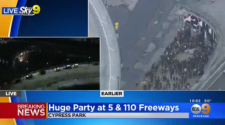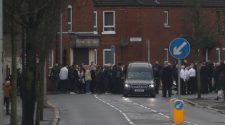Councils across England are systematically breaking the law by relocating hundreds of homeless people outside of their boroughs without notifying the authorities receiving them.
An investigation found that schools are being overwhelmed, with northern cities such as Bradford having received at least 290 households from 31 different boroughs in the past two years, many of them from London, Kent and Essex.
If a homeless person is moved elsewhere in the country, local authorities are legally supposed to notify the council in charge of where they are being placed so social, medical and educational support can be put in place.
But a Ross Kemp ITV documentary found that at least 60 councils failed to comply with this legal duty. The investigation found:
• Failures have resulted in schools in some areas facing a doubling of demand for class places and food banks being overwhelmed by unexpected demand.
• The council leader of Basildon, Essex, said his authority had no choice but to find residents new homes in northern counties because its housing stock was being used by London councils which could outbid his for private rented accommodation. This domino effect is exhibited across the country.
• Some councils are buying properties outside their areas for the express purpose of accommodating residents. Seven London authorities have spent more than £80m on property in other boroughs in the capital, Kent, Oxfordshire and Hertfordshire, despite homelessness guidance that says residents should stay in their home neighbourhoods unless in exceptional circumstances.
Gavin Callaghan, the leader of Basildon council, said: “In the last four years, we’ve had an entire primary school’s worth of children come into our borough from other boroughs. And 58% of the time we haven’t been notified when people have been moved into the borough. We need to know to make sure enough school places are available. It puts pressure on our other local services; GP surgeries and hospital are under huge pressure.”

He said moving people was not solving the homelessness crisis. “We are talking about some of the most vulnerable people in our communities and we are not providing services, not through any fault of council or other services, but because we simply don’t know about these people until they present needing services.”
He said that with so much of Basildon’s available housing stock being used by London councils, his council was finding it difficult to source local accommodation for its own residents at risk of homelessness.
“We have seen some of our residents leave the borough, they’ve gone as far as Durham and Nottingham. It’s an absolute last resort and we try to always work with people to see if they have family connections and a support network.”
The homelessness code of guidance states that households should be found accommodation within their boroughs, so far as is reasonably practicable, but through freedom of information requests, the documentary found that since 2018, individuals and families have been moved a total of around 400,000 miles away from their local areas, the equivalent of 16 times around the world.
The displacement does not only involve households being moved from south to north. Councils from every region in England are securing accommodation for residents in other areas all around the UK, including Wales, Scotland and Northern Ireland, and some households are being relocated up to 550 miles from their home boroughs.
Among the areas receiving the most homeless people are Birmingham, with 370 households from 44 different councils; Manchester, 112 households from 36 councils; and Thurrock, in Essex, to which 125 households were relocated in recent years.
About 28,000 households are moved out of their boroughs every year, leading to accusations of social cleansing. Eight years ago, Boris Johnson, the then mayor of London, criticised councils that were moving housing benefit claimants out of the capital, saying he would not have “Kosovo-style social cleansing” of poor people in London.
The documentary explores the detrimental effects on uprooted families and uncovers stories of housing officers telling families from Kent and Essex that if they refused to accept offers of accommodation in Bradford, 200 miles away, they would be declaring themselves intentionally homeless and risked having their children taken into care.

• Ross Kemp: Living With ‘Forced Out’ Families is on ITV on Thursday 2 July at 7.30pm


















A Smart Approach To Retaining Most Of The A-10s « Breaking Defense